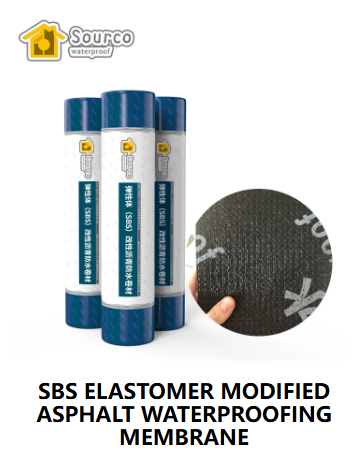SBS modified asphalt is quickly becoming one of the best solutions for flat and low-slope roofs. It blends traditional asphalt with a rubber-like material called Styrene-Butadiene-Styrene (SBS), creating a strong and flexible roofing product. This unique mix gives SBS roofing excellent durability and the ability to handle extreme weather without cracking or breaking.
A Simple Introduction to SBS Modified Asphalt
SBS is a type of synthetic rubber. When it’s combined with asphalt, it forms a flexible roofing membrane that keeps its shape, even when stretched or bent. This is important because buildings move over time. They expand and contract with the weather. If your roof can’t move with the building, it may crack or leak. Fortunately, SBS can flex without damage, which helps your roof last longer.
Also, because SBS membranes are made with rubber, they don’t become stiff in cold weather. Instead, they stay soft and flexible. This means they are less likely to break or fail, even when temperatures drop below freezing.
Why Flexibility Matters for Your Roof
A roof isn’t just a cover — it’s a key part of the building’s protection. Flat roofs, in particular, need materials that can handle more movement. That’s where SBS modified asphalt stands out. It stretches with the building instead of fighting against it. As a result, SBS roofs experience fewer cracks, leaks, and repairs over time.
Imagine a roof that doesn’t get brittle in the cold or melt in the heat. SBS performs well in all seasons. Whether your building faces heavy snow in winter or strong sun in summer, this material keeps performing.
How SBS Compares to Other Roofing Options
There are other modified roofing systems out there, like APP (Atactic Polypropylene). Both SBS and APP use asphalt as a base, but they behave differently. APP uses plastic modifiers, while SBS uses rubber. Because of this, SBS is more flexible and handles building movement better.
APP roofs can resist UV rays well but are not as stretchy as SBS roofs. For that reason, SBS is often a better choice for buildings in areas with wide temperature changes or that require a more flexible system.
If you’re choosing between the two, think about your building’s needs. Do you want something that moves with the structure and lasts longer? SBS is the answer.
Easy and Flexible Installation
Another reason why SBS modified asphalt is so popular is the variety of ways it can be installed. Roofers can apply SBS membranes using different techniques:
- Heat-welding (also called torch-down)
- Cold adhesives
- Self-adhesive sheets
- Hot asphalt
- Mechanical fastening
Each method has its own benefits. For example, heat-welding is common because it forms a tight, waterproof seal. Even though it may look complex, trained professionals can install SBS quickly and cleanly. In fact, many contractors prefer SBS because it’s easier to handle than other materials.
Also, SBS membranes can be added to old roofing systems. If your current roof is still flat and in decent shape, a roofer might be able to install SBS right over it. This can save time, reduce costs, and limit construction mess.
Reinforcement in SBS Modified Asphalt for Extra Strength
SBS membranes can include added layers for strength. These layers often use materials like fiberglass or polyester. They help the roof resist tearing, stretching, and damage from foot traffic. With the right reinforcement, your SBS roof becomes even more dependable.
Contractors choose the best type of reinforcement based on your building’s shape and how much stress the roof will face. These added layers don’t reduce flexibility—they boost performance.
The Top Benefits of SBS Modified Asphalt
SBS modified asphalt has many advantages that make it a smart pick for building owners, developers, and facility managers.
1. Flexibility That Lasts
The rubber in SBS allows the material to move with the building. It stretches and bounces back without tearing.
2. Strong Weather Resistance
SBS can handle sun, snow, rain, ice, and wind. It keeps working in both hot and cold climates.
3. Long Service Life
A well-installed SBS roof can last 30 years or more. Its resistance to wear and damage means fewer repairs and a longer life.
4. Great for Waterproofing
If your building has a flat roof, standing water can be a problem. SBS membranes are waterproof and help prevent leaks.
5. Fast and Simple Application
There are many ways to apply SBS, making it easier to work with on different buildings. Roofers like the clean finish and easy handling.
6. Lower Long-Term Costs
Because SBS lasts longer and needs fewer repairs, it often saves money over time. You spend less on maintenance and replacement.
7. Sustainable Options
Some SBS systems can go right over existing roofs. This reduces waste and lowers the environmental impact of your project.
Where SBS Works Best
SBS modified asphalt is used in many industries. It’s a favorite for buildings like:
- Offices and commercial centers
- Hospitals and schools
- Warehouses and factories
- Shopping malls
- Apartment buildings
- High-end homes with flat or low-slope roofs
It’s also great for roof replacement jobs. Instead of tearing off the old roof, contractors can install SBS right on top in some cases. This saves time and protects the building more quickly.
A Smart Investment for the Future
With so many benefits, it’s no surprise that SBS modified asphalt is one of today’s top roofing choices. It delivers long-term protection, handles rough weather, and reduces the need for repairs. For owners who want peace of mind, SBS is a reliable and proven solution.
If you’re planning a new build or need to upgrade your current roof, consider SBS modified asphalt. Its mix of strength, flexibility, and weather protection makes it the smart way to protect your investment.


